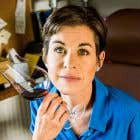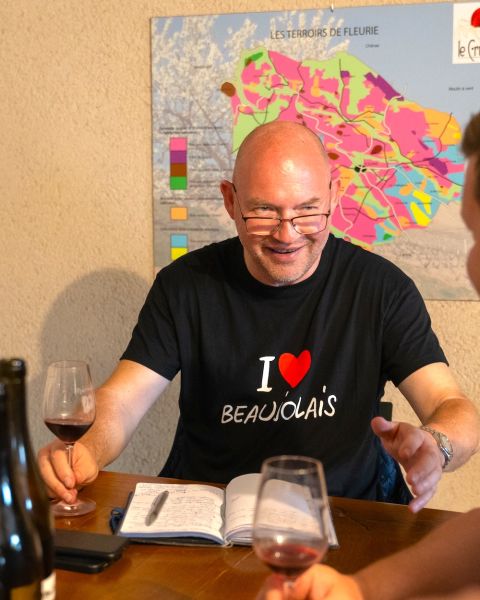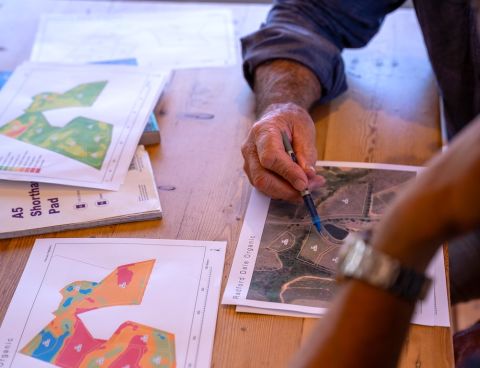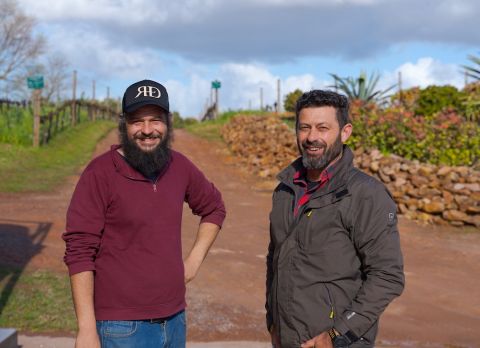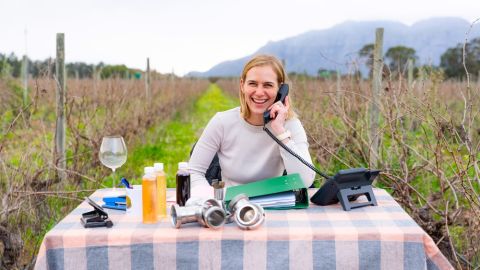Not many British-born, South African wine producers can claim to have grown up in the only English pub in Beaune (and probably Burgundy) – a pub called, of all things, Pickwick’s. But Burgundy was where Alex Dale spent his teenage school years (between pulling pints at Pickwick’s) and the best part of a decade of his working life, some of that time employed by Jacques Prieur in Meursault. And then he abandoned France in 1994 for the brave new world of post-apartheid South Africa. It was in Burgundy that Dale met Barossa-bred winemaker Ben Radford, and then, a few years later, it was at Longridge in Stellenbosch that their paths crossed again. At the time Radford was Longridge’s head winemaker. The two of them decided to make wine together and in 1998 bottled the first vintage of Radford Dale.
A quarter of a century on, Radford Dale has grown from two young guys buying grapes and borrowing winery space to two wineries (one in Helderberg Mountain, Stellenbosch, the other a fully organic estate in Elgin) and a full-time team of 20 people. Ben Radford headed back to his Barossa homeland a few years ago where he is now making wine for Stonegarden, but Dale is still there. Despite the Syrah, Grenache, Pinotage and Cabernets in his portfolio of vineyards and wines, he has never lost his love for and link to the burgundian wines that shaped his world – including Gamay. Beaujolais, it is safe to say, is a slight obsession for Dale – he’s not only one of the driving forces behind South Africa’s groundbreaking (for the country) Beaujolais Fest, but he also imports into South Africa the wines from no fewer than 12 beaujolais producers, as well as Gamay wines from three other countries.
So it’s no surprise that it was Radford Dale who, in 2017, put in the first new planting of Gamay for nearly 30 years – a one-hectare (2.2-acre) vineyard in the Polkadraai Hills of Stellenbosch. May I just pause here to suggest that you commit the name Polkadraai to memory? It is, arguably, one of the most exciting nooks of Stellenbosch. Polkadraai is where Reyneke has vineyards. The Karibib farm, where the Radford Dale Gamay vineyard is planted, is where Alheit, Savage, Sons of Sugarland, Van Loggerenberg, Craven and Raats are getting fruit for some of their most treasured wines. Radford Dale has used this vineyard (established with clonal material from Beaujolais and planted on granite, ‘finally, on the right soils’) to graft vines for a new vineyard on their organic Elgin estate, and they’re keen to use it to propagate cuttings for other producers. Tom Prior, business development manager for Radford Dale, told me that ‘there are less than 10 hectares of Gamay currently planted in the Cape, the majority of which are managed or owned by us’.
I didn’t, however, know any of this when I first tasted Radford Dale’s Vinum Gamay Noir, which comes from this Karibib vineyard. Taking the wine at face value, I wrote, ‘It is, quite frankly, an utterly scrumptious wine. You could sum it up entirely in those four last words alone.’ Our own Julia Harding MW praised the previous two vintages (which include fruit from an older vineyard as well), and I really loved the 2023. It has the energy, peppery brightness and purity of fruit that you’d find in a Beaujolais-Villages, and the length and texture of a cru bottling. The alcohol is a modest 12.5%, and the tannins tap-dance across your tongue. If you’re looking for appetising, non-tiring reds that can please a crowded, loaded, jostling table of disparate food and disparate people during the festive season, this might be one answer.
There is one more element that makes me appreciate this wine even more: Radford Dale has strong, genuine sustainability ethics. They farm along regenerative viticulture principles in all the vineyards they own and can control, and are in the process of extending the Ecocert organic certification they already have for the Elgin estate to their Stellenbosch vineyards. They are members of the IPW (Integrated Production of Wine, which is South Africa’s environmental sustainability scheme). They have signed up to the Sustainable Wine Roundtable’s Bottle Weight Accord, and are in the process of reducing bottle weights across their entire range. This particular bottle weighs a mere 1,170 g when full. That’s pretty much as light as glass wine bottles currently come today. A massive installation of solar panels at the Elgin estate this year means that this winery is now entirely off grid and running on clean energy. They’ve been certified members of WIETA (Wine Industry Ethical Trading Association) since 2010, and in 2007 set up the Land of Hope Trust funded by the profits of their Land of Hope range of wines to benefit Radford Dale employees and their children through education. Finally, winemaking is unmeddlesome and transparent: no added yeasts, acid, or any other additives, no fining, and very little added sulphites.
Right now, you can find both the 2022 and 2023 on the market. The 2022 is going to give you more roundness and richness, the 2023 more brightness and freshness. You won’t lose either way. They’re both wines that will allow you to kick back and enjoy the people you’re with and the food on the table – delightful dinner companions who won’t interrupt or muscle into the conversation. Equally, if you want a light-hearted friend to lift your spirits on a dark winter evening, this Gamay will do it. Radford Dale wines are imported into the UK by Les Caves de Pyrene, which is selling the 2022 for £16.45 but will soon have the 2023 on the shelves. The 2023 is available from The Wine Scouts for £17 and Sugarbird Wines for £18.95. In the US, it’s available from Yiannis Wine Shop (VA) for $26.99, and it’s also available in Denmark and Hong Kong. From 2025, the US importer will be Alain Junguenet in New Jersey.
Love Gamay? Us, too. Members will find more than 150 tasting notes for Gamays from South Africa to British Columbia in our tasting notes database, plus over 2,000 notes on red Beaujolais.
All images provided by Radford Dale. The top image is of the team harvesting Gamay at Karibib in the Polkadraai Hills of Stellenbosch.
